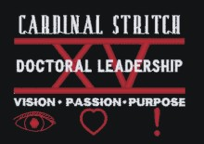
As was the case last year, many new changes have unfolded in my job for the upcoming year. I suppose it is a blessing in that the jobs keep presenting themselves because people must be happy with the work I am doing. At the same time, these changes bring challenges.
I once thought that by this point in my life I would have taken over as Director of Wisconsin Education Innovations. Accepting that this was not my calling at this time has been a great experience. Because of the classes and learning and knowing what I know about leadership had made it easier to let things unfold instead of fighting for what I thought was supposed to happen. By letting go, new opportunities have emerged, ones that I feel are a calling.
Jeff Monday, the principal and vice president of Messmer, took a new job at Marquette University High School. This was really an unexpected event and it has left me wondering what my capacity at the school will be. Last year Jeff brought me on as a consultant and bought out 80% of my contract with WEI. With him leaving I really wondered what the state of my job would be...and even at times...if I would have a job at all.
In our meetings before I left, Jeff was very hopeful that I would become the leader of Messmer Catholic Schools. That I would step in and help to continue the great work that has been started there. I didn't know if I wanted to leave WEI and worried about doing so. What has happened over the past few weeks has been so telling. It has made me appreciate my leadership training to the fullest. It has also really opened my eyes to what service means within the definition of leadership.
I have not been named the "lead administrator" for Messmer. I will continue on in my current capacity. I will not be moving into Jeff's office. I will not be a full time Messmer employee. However, Messmer needs leadership. I am committed to offering that service to them. At one time the title, the office, the position is what I thought leadership was about. Now I have truly come to know that none of this really matters. It's about how your leadership manifests in other people.
The speakers this summer at Summer Institute had many great words of wisdom that I can continue to take with me on my journey. These are quotes to live by and to help me understand how I can make the greatest impact.
- "It is not about you! It's about the success of everyone around you!" (Bergemann, 2010)
- "You don't always get what you want, you get what you need and it comes at the the appropriate time." (Behar, 2010)
- "Wear one hat. And that is not talking about the roles, but who we are." (Behar, 2010)
- "You are a symbol of what you do." ( Peterson, 2010)
- "You need to build relationships first." (Mortensen, 2010)
As I continue down the path of becoming the most effective leader I can be, this next year will provide opportunities that I have not had a chance to encounter. I think it is interesting that it is all happening during the service year when I am most focus on really living my mission through service. I will remember that it is really all about the people and helping others grow (It is all about the people). I must remember the power of putting great minds together to explore issues we thought we had no answers to (Case Study: A study of great minds working together). I know that the greatest part of leadership is paying attention to that delicate balance of leading and letting others take the lead (31 Leaders). I must always remember that I am being watched and that my actions speak much louder than my words (Collapse: The lesson behind the lesson). Most of all I must remember through all of this that humor is a must (That one essential key: Humor).
In looking back over the past three Summer Institutes, I marvel at the transformation that has happened within myself. While I know many of the qualities that I need to work on are still there, I can tell that I have been transformed in this process. Thank you!
Behar, H. (2010, June). Leadership principles from a life at Starbucks. Lecture delivered at Summer Institute at Cardinal Stritch University, Milwaukee, WI.
Bergemann, K. (2010, June). Leadership at the presidential level. Lecture delivered at Summer Institute at Cardinal Stritch University, Milwaukee, WI.
Mortenson, J. (2010, June). Three cups of tea: A mother's perspective. Lecture delivered at Summer Institute at Cardinal Stritch University, Milwaukee, WI.
Petererson, K. (2010, June). Leading and shaping school cultures. Lecture delivered at Summer Institute at Cardinal Stritch University, Milwaukee, WI.


